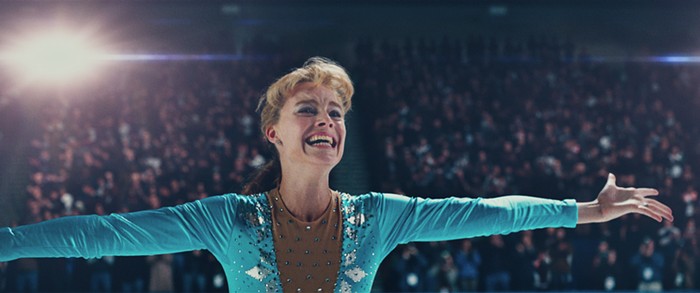
Tonya Harding was never my favorite figure skater. As a five-year-old, I rooted for dark horse Nicole Bobek. She didn’t have Harding’s athleticism, but no one did. In a sport that worshipped a retrograde notion of femininity, Harding was considered a freak, even though she was arguably the most technically skilled skater of her time. In the wake of the infamous 1994 attack on Nancy Kerrigan (which she may or may not have had a hand in), Harding was further ostracized, transformed by the nascent 24-hour news cycle into a white-trash demoness—so it’s important that any fictional depiction of her life acknowledge that she was also a real person who suffered.
I, Tonya, is a solid attempt, largely thanks to Margot Robbie’s portrayal of a very human, very sympathetic Tonya. Without sugarcoating Harding’s personality (which could be caustic) or her tragic life (which was full of abuse and abandonment), I, Tonya tells a familiar story of a woman whose life was ruined by hapless, cruel men and sexist gatekeeping.
In a moment of heightened awareness around sexual abuse and workplace harassment, Harding’s story couldn’t be more timely. She wasn’t a perfect victim, but her suffering was real. And due to associations with awful men who undermined her career—like her abusive husband, Jeff Gillooly, played here by Sebastian Stan, with a disturbing combination of overt brutality and performative sweetness—Harding lost the one constant in her chaotic life: figure skating. (It's worth remembering, too, just how good she was at it: Harding's famed triple axel is so tough to pull off that in I, Tonya, it had to accomplished through edited footage of a double.)
I, Tonya has been criticized for its stylized, darkly comic depiction of abuse, but it’s also one of the only portrayals I’ve seen that presents Harding as a person, and that acknowledges she was abused. It’s hard not to root for her in the film—she's a talented weirdo surrounded by bad men, whose raw determination can’t be blunted by an equally abusive and narcissistic mother (an excellent, unnerving Allison Janney) who teaches her to conflate being loved with being hit. It’s impossible not to empathize with Harding, and to imagine what her career and life might have looked like had she been able to make a clean break from her abusive family.
Or at least it seemed that way. On the way home from I, Tonya, my Lyft driver told me that her cousin lived next door to the real Tonya Harding. When I said I felt bad for Harding, she responded by telling me she’d heard Tonya was a horrible person. Old myths die hard.


















